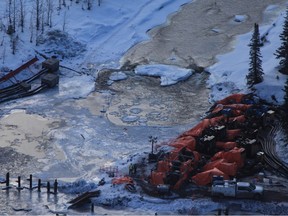Photos show openings in dams meant to hold back water to allow construction at the river crossing.

A pair of Wet’suwet’en hereditary chiefs are calling for B.C. and federal regulators to halt construction on a Coastal GasLink pipeline river crossing in northwest B.C. because of continuing concerns about environmental damage.
Just weeks after raising questions about damage to fish spawning habitat on the Clore River crossing, the hereditary chiefs and the David Suzuki Foundation now claim there has been environmental damage from flooding at the same site.
Start your day with a roundup of B.C.-focused news and opinion delivered straight to your inbox at 7 a.m., Monday to Friday.
Thanks for signing up!
A welcome email is on its way. If you don't see it, please check your junk folder.
The next issue of Sunrise presented by Vancouver Sun will soon be in your inbox.
Photos taken Jan. 29 show there were openings in dams meant to hold back water to allow construction at the river crossing in remote northwest B.C., southeast of Terrace.
The crossing is part of TC Energy’s $11-billion natural gas pipeline that will feed Canada LNG’s $18-billion export liquefied natural gas plant near Kitimat.
The controversial 670-kilometre pipeline project is expected to be completed this year.
Coastal GasLink, a subsidiary of TC Energy, says there was a “temporary” overflow of its barrier at the Clore River on Sunday to manage the rise in water levels due to high temperatures.
The B.C. Oil and Gas Commission, which has responsibility for pipeline river crossings, says its inspectors plan to visit the site on Thursday but have not noted any non-compliance based on information they have so far.
The federal Department of Fisheries and Oceans said it could not respond Tuesday to questions.
Wet’suwet’en hereditary chiefs who flew by helicopter to the worksite said they observed washouts of dams below water pumps and below the pipeline trenching site, resulting in flooded equipment, debris and sediment floating in the worksite, and heavy sediment loads being washed downstream.
In order to carry out the construction work in a dry area, water is pumped through lines on land and then flows back into the river farther down river.
“Coastal GasLink has lost control of this river crossing, and our fish are paying the price,” said Tsebesa, a chief in the Likhts’amisyu (Fireweed) clan, whose traditional territory encompasses the site.
Tsebesa, also known as Lillian Smith, is calling for work to stop until hereditary chiefs can meet with B.C. and federal regulators to ensure there are “people and plans in place to uphold the law.”
In a written statement, Coastal GasLink said it was monitoring the rise in temperatures last week and an anticipated rise in water levels.
“Based on our approved work execution plans, we determined that allowing our barriers at the Clore River to temporarily overflow on Sunday would be the safest way to manage our work site,” said the company.
The overflow ended as water levels upstream subsided, and isolation of the construction area was restored that same day, said the company.
Coastal GasLink said “at this point” there has been no significant increase in turbidity levels or impact to fish and wildlife.
Na’moks, hereditary chief of the Wet’suwet’en beaver clan, was also on the helicopter flight.
“We didn’t consent to this project. They violently forced it on us. The least the regulators could do is ensure the job is being done right,” said Na’moks, who is also known as John Risdale.
While some hereditary chiefs are opposed to the pipeline project, elected councils of 20 First Nations along the pipeline route have signed community and project agreements with the company.
Severn Cullis-Suzuki, executive director of the David Suzuki Foundation, said the Coastal GasLink project has shown that despite claims that B.C. has some of the best environmental standards in the world, its enforcement regime is not ensuring those standards actually protect fish or water quality.
Coastal GasLink has faced warnings and fines from the province over recurring issues with erosion and sediment control during construction of the pipeline.
Recently, the B.C. Environmental Assessment Office issued a third fine of $213,600 for erosion and sediment control related to an incident a year ago, although the agency said more recent inspections have shown improvement.
And the B.C. Oil and Gas Commission found no regulatory violations on the Clore River over concerns of damage to salmon and steelhead spawning habitat.
ghoekstra@postmedia.com
twitter.com/gordon_hoekstra


